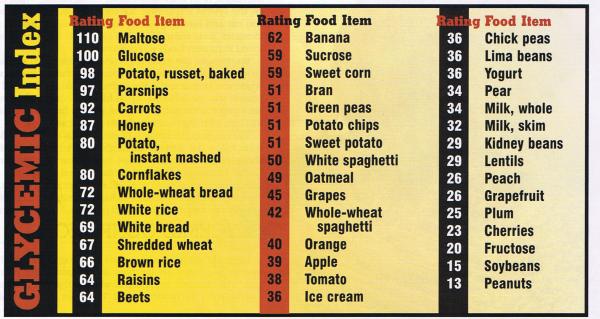Let's talk about...the GI Index
Acg67
Posts: 12,142 Member

::Repost since I messed up the title on the last one::
You see a lot of threads around the forum like white rice vs brown rice, whole wheat vs white pasta, "good carbs" vs "bad carbs". And inevitably someone will bring up one product having a lower GI, so it is better for you and particularly for weight loss. So let's take a look at the GI index and mostly how it pertains to weight loss. A lot of this info came from Alan Aragon's article here; http://www.alanaragon.com/elements-challenging-the-validity-of-the-glycemic-index.html. I added in some basic info on the GI index , added some more studies and added a few other little things as well.
1. First what exactly is the GI index?
The GI index was invented by Dr. David Jenkins in 1981 to help diabetics manage their blood sugar levels. It is calculated by testing a isocaloric amount of carbohydrate on a fasted subjects and measuring the blood glucose AUC for the subjects. It is then divided by the standard (generally glucose which has a GI rating of 100) and multiplied by 100. The ratings are supposed to signify the rate at which the food releases sugar into the system and how quickly it is digested. The faster the food is digested or absorbed, the faster it releases glucose leading to a spike in glucose level in the blood. Although interestingly enough, it is possible that a lower GI means the quicker removal of glucose not it's appearance, see;
Schenk S et. al. Different glycemic indexes of breakfast cereals are not due to glucose entry into blood but to glucose removal by tissue. Am J Clin Nutr. (2003) 78(4):742-8.
http://www.ajcn.org/content/78/4/742.full.pdf
Also another thing to keep in mind, numerous factors can alter or effect a food's GI, such as; If you are fasted or not, how you cook the food, if the food is combined with other foods etc etc.
2. What about insulin, doesn't a low GI mean it will produce a lower insulin spike?
Without getting into why most people don't have to worry about foods that spike their insulin, the answer is, while the GI index and the insulin response to said foods correlate relatively well that is not always the case. See;
Holt et al. An insulin index of foods: the insulin demand generated by 1000-kJ portions of common foods. American Journal of Clinical Nutrition, Vol 66, 1264-1276
http://www.ajcn.org/content/66/5/1264.full.pdf+html (Pay attention to Table 4)
Östman et al. Inconsistency between glycemic and insulinemic responses to regular and fermented milk products. American Journal of Clinical Nutrition, Vol. 74, No. 1, 96-100, July 2001
http://www.ajcn.org/content/74/1/96.full
3. So talk to me about weight loss. Every diet guru says to eat low GI foods for weight loss.
The rationale for so called gurus recommending low GI foods for weight loss varies from increased satiety to more stable blood sugar throughout the day to preventing insulin spikes. However if we look at the studies testing high GI vs low GI, we see that many find no difference in weight loss. Also many of the studies, esp the shorter term ones are set up as an all high GI vs all low GI diet, which doesn't reflect your avg person's diet who eats both high and low GI foods. And in those studies we still find that weight loss isn't always greater in the all low GI diet. Below are some of the studies supporting that low vs high GI foods don't make a difference in weight loss.
An 18-mo randomized trial of a low-glycemic-index diet and weight change in Brazilian women
http://www.ajcn.org/content/86/3/707.abstract
Conclusions: Long-term weight changes were not significantly different between the HGI and LGI diet groups; therefore, this study does not support a benefit of an LGI diet for weight control. Favorable changes in lipids confirmed previous results.
Reduced glycemic index and glycemic load diets do not increase the effects of energy restriction on weight loss and insulin sensitivity in obese men and women.
http://www.ncbi.nlm.nih.gov/pubmed/16177201
In summary, lowering the glycemic load and glycemic index of weight reduction diets does not provide any added benefit to energy restriction in promoting weight loss in obese subjects.
Long-term effects of 2 energy-restricted diets differing in glycemic load on dietary adherence, body composition, and metabolism in CALERIE: a 1-y randomized controlled trial
http://www.ajcn.org/content/85/4/1023.abstract?ijkey=57903af923cb2fcdc065ffd37b00a32e22f4c5cf&keytype2=tf_ipsecsha
Conclusions:These findings provide more detailed evidence to suggest that diets differing substantially in glycemic load induce comparable long-term weight loss.
No effect of a diet with a reduced glycaemic index on satiety, energy intake and body weight in overweight and obese women.
http://www.ncbi.nlm.nih.gov/pubmed/17923862
CONCLUSION:
This study provides no evidence to support an effect of a reduced GI diet on satiety, energy intake or body weight in overweight/obese women. Claims that the GI of the diet per se may have specific effects on body weight may therefore be misleading.
Diaz EO et. al. Glycaemic index effects on fuel partitioning in humans. Obes Rev. (2006) 7:219-26.
http://onlinelibrary.wiley.com/doi/10.1111/j.1467-789X.2006.00225.x/full
Summary
The purpose of this review was to examine the role of glycaemic index in fuel partitioning and body composition with emphasis on fat oxidation/storage in humans. This relationship is based on the hypothesis postulating that a higher serum glucose and insulin response induced by high-glycaemic carbohydrates promotes lower fat oxidation and higher fat storage in comparison with low-glycaemic carbohydrates. Thus, high-glycaemic index meals could contribute to the maintenance of excess weight in obese individuals and/or predispose obesity-prone subjects to weight gain. Several studies comparing the effects of meals with contrasting glycaemic carbohydrates for hours, days or weeks have failed to demonstrate any differential effect on fuel partitioning when either substrate oxidation or body composition measurements were performed. Apparently, the glycaemic index-induced serum insulin differences are not sufficient in magnitude and/or duration to modify fuel oxidation.
4. But bro, don't I need a high GI carb post workout to spike the insulinz and shuttle nutrients to my muscles to get swole?
Actually post workout is one place where GI may come into play just not for the vast majority of people. If you just finished a glycogen depleting event and have another one short coming (say a few hrs) then a high GI carb to rapidly replenish glycogen might be of some use. But the vast majority of people will never find themselves in such as a situation.
As for needing a high GI carb to spike insulin to shuttle nutrients to your muscles, that is unnecessary. If you paid attention to Table 4 in the insulin index study, you'd have seen protein spikes insulin as well. And more recent research has found that further spiking insulin by adding a carb to protein post workout does not further stimulate MPS, see;
Carbohydrate does not augment exercise-induced protein accretion versus protein alone. Med Sci Sports Exerc. 2011 Jul;43(7):1154-61
http://www.ncbi.nlm.nih.gov/pubmed/21131864
CONCLUSIONS:
Our data suggest that insulin is not additive or synergistic to rates of MPS or MPB when CHO is coingested with a dose of protein that maximally stimulates rates of MPS.
Disassociation between the effects of amino acids and insulin on signaling, ubiquitin ligases, and protein turnover in human muscle
http://ajpendo.physiology.org/content/295/3/E595.full
"However, it was surprising that adding insulin at higher than systemic postabsorptive concentrations had no further effects on MPS or LPS. We cannot account for these differences except to raise the possibility that in our studies the stimulatory effects of amino acids stimulated protein synthesis to a maximal extent and that further addition of insulin had no additional effect"
5. I don't like reading, clifs?
GI index created to help diabetics manage blood sugar levels
High GI # doesn't always =/= large spike in insulin and vice versa
Mult long and short term trials so no difference in weight loss between high GI diets vs low GI diets
A high GI carb may be of some benefit if you have mult glycogen depleting events in a single day
A high GI carb with protein post workout to spike insulin is broscience
To sum it all up I'd say a food's GI is largely irrelevant in determining body composition. Note where I said body composition, not health. Typically lower GI foods are less refined and more nutrient dense but not always, which is something you should consider before just basing your decision off a food's GI.
And since someone will just ignore the above and use a silly non real world example like, well then I'll just eat a ton of table sugar everyday and we'll see how my weight loss is. I'll just leave this link at the bottom and you can read it if you want to bring that argument up.
www.ajcn.org/content/65/4/908.full.pdf
0
Replies
-
Good stuff as usual

Let me just add this one thing:
Hitting your daily macro/micronutrient and calorie targets is FAR more important that micro-managing the types of foods your eat and their respective effect on your body. In the end.. Hit your macros and live your life.0 -
Good info, took me awhile to adjust to this thinking, glad I did though. Had way too much bro science ingrained in my head from years of crappola thrown my way. I'm happy there are people, like yourself, spreading good info to others. Props sir.
Kanye Approved 0
0 -
Good stuff as usual

Let me just add this one thing:
Hitting your daily macro/micronutrient and calorie targets is FAR more important that micro-managing the types of foods your eat and their respective effect on your body. In the end.. Hit your macros and live your life.
That is a good point and I should prob add that of course the point on not worrying about GI was geared towards non diabetics, I would hope that would have been understood0 -
Would you say daily macros are more important than individual meal macros? Always wondered that..0
-
Excellent post my racist friend!0
-
Would you say daily macros are more important than individual meal macros? Always wondered that..
Vastly so. Edit: I'm not acg, but sometimes I wish I was so I replied.0 -
Would you say daily macros are more important than individual meal macros? Always wondered that..
Vastly so. Edit: I'm not acg, but sometimes I wish I was so I replied.
lol, thanks though, appreciated.0 -
bump0
-
bump
Grind0 -
great posts, as usual
 0
0 -
I do notice for myself that a low GI Index eating style works very nicely for me in the health department as I have much more energy for performing lots of fitness activities. I don't obsess about it but I do try to keep to the lower GI index foods - which really as basically eating in a healthy lifestyle by cutting out processed whites (flour and sugar), eating complex carbs and protein. I've been at it for about a month and have broken my plateau and feel much more energetic with less of the refined sugars, etc. in my system.
In a way it IS making me more fit because I have more energy and can work out more! Yay! 1
1 -
Awesome post! Thanks for the info :flowerforyou:0
-
bump for later0
-
Hit your macros and live your life.
THIS!0 -
What do you mean by hitting your macros and micros? Viewing that you have lost a substantial deal of weight-Congratulations on the enormous weight loss-I value your insight on weight loss. I only have about 30 pounds to loose and feel defeated already. Can really use some advice from you. Thanks
Mary0 -
Bump for after work reading0
-
Excellent post. Thank you.0
-
I do notice for myself that a low GI Index eating style works very nicely for me in the health department as I have much more energy for performing lots of fitness activities. I don't obsess about it but I do try to keep to the lower GI index foods - which really as basically eating in a healthy lifestyle by cutting out processed whites (flour and sugar), eating complex carbs and protein. I've been at it for about a month and have broken my plateau and feel much more energetic with less of the refined sugars, etc. in my system.
In a way it IS making me more fit because I have more energy and can work out more! Yay!
I, too, try to eat lower GI foods, and it has paid off for me. But, then again, I am insulin resistant, so I'm the type of person the GI ranks were made for. Unlike non-IR folks, I actually do produce more insulin in response to food, whether or not the food is low GI. Since ibsulin triggers fat storage, even a modest diet will likely lead to weight gain for an IR person. Low GI is just one of the tools in the belt, to keep overall calores low, while still making nutritious food choices.0 -
My understanding is that low GI eating decreases your risk of diabetes and heart problems. Maybe 3 or 4 years ago, my husband and I practiced eating low GI for a period of time. We weren't counting calories, but we both lost about 20 lbs. When I got away from it and added back some of the high GI foods, I gained back 15 lbs. Since I started MFP, I try to stick with mostly low GI foods. I'm older and have to be more concerned with health issues caused by poor eating habits.0
-
I, too, try to eat lower GI foods, and it has paid off for me. But, then again, I am insulin resistant, so I'm the type of person the GI ranks were made for. Unlike non-IR folks, I actually do produce more insulin in response to food, whether or not the food is low GI. Since ibsulin triggers fat storage, even a modest diet will likely lead to weight gain for an IR person. Low GI is just one of the tools in the belt, to keep overall calores low, while still making nutritious food choices.
I agree wit this..I too have IR..and try to stick with low GI foods..but as you stated above..it doesnt matter for those who dont have medical issues0 -
I was also under the impression that GI is based on food solely by itself, and mixing it with other foods completely changes it's GI profile. Sounds complicated.
I guess it does help with diabetics, I'm curious if it helps with those people like me who have ...pre-diabetes..whatever it's called...metabolic disorder or something?0 -
I was also under the impression that GI is based on food solely by itself, and mixing it with other foods completely changes it's GI profile. Sounds complicated.
Yes, it is calculated using an isocaloric amount of food on fasted subjects. So if you are not fasted or if you eat it with any other food it will alter the GI. Also different cooking methods alter the GI, generally raw foods have a lower GI then cooked0 -
Thanks for the info!0
-
Can we get this in the FAQ?0
-
 0
0 -
Bump for later.0
-
Great post. I've always been a fan of empirical data. Well done, sir.0
-
Excellent post, stopped my head from spinning a bit from the earlier chatter I was reading.
Thanks!0 -
*gives ACG a high five*0
-
This needs to get bumped.0
This discussion has been closed.
Categories
- All Categories
- 1.4M Health, Wellness and Goals
- 398.1K Introduce Yourself
- 44.7K Getting Started
- 261K Health and Weight Loss
- 176.4K Food and Nutrition
- 47.7K Recipes
- 233K Fitness and Exercise
- 462 Sleep, Mindfulness and Overall Wellness
- 6.5K Goal: Maintaining Weight
- 8.7K Goal: Gaining Weight and Body Building
- 153.5K Motivation and Support
- 8.4K Challenges
- 1.4K Debate Club
- 96.5K Chit-Chat
- 2.6K Fun and Games
- 4.8K MyFitnessPal Information
- 12 News and Announcements
- 21 MyFitnessPal Academy
- 1.5K Feature Suggestions and Ideas
- 3.2K MyFitnessPal Tech Support Questions


















